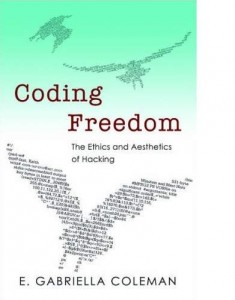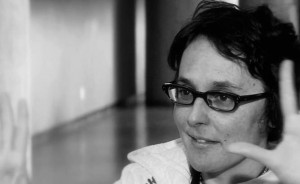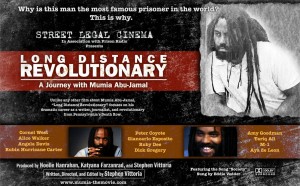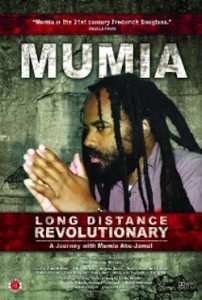Podcast: Play in new window | Download
Updates:
- Pope’s Resignation May Make International Prosecution Easier
- All Charges Dropped For Occupy Protesters
- A Call for Drastic Changes in Educating New Lawyers
—-
Coding Freedom: The Ethics and Aesthetics of Hacking
In the past 2 years, we’ve discussed in many interviews and updates, the attacks on whistle-blowers and hackers. The emerging movement of programmers, hackers, open source software, online communities has challenged and exposed corporate and government control and surveillance, making them targets of prosecution. As many may know, our own Michael Ratner has represented whistle-blower Julian Assange, computer activist Jeremy Hammond, and has been a legal adviser to many others including the late Aaron Swartz. Today we talk with author Gabriella Coleman about her recently published book Encoding Freedom: The Ethics and Aesthetics of Hacking. It’s a good place to start for those learning about the political significance of free software, intellectual property and the morality of computer hacking.
Gabriella Coleman:
- When you utter the word hacker, usually the image that pops into people’s minds is nefarious criminal. That can be the case but really hackers are composed of an extremely lively group of individuals who tend to be computer programmers and network administrators, who actually are committed to a range of civil liberties such as free speech and privacy. Especially in the last decade they’ve been involved in political activities as well.
- They’re quite a bit of diversity among hackers, technically.
- Hackers – are keenly aware of the issues such as censorship, which impact the present and the future of the internet. Some hackers are committed to insuring internet freedoms for their own productive autonomy.
- Beyond productive autonomy they’re really starting to care about the broader issues relating to internet freedoms and how they relate to democracy at large.
- In order for software to be made, it must be written in a programming language such as C++, Python and Pearl and its written in source code. These are the underlying directions of software.
- A very prominent group of hackers who are committed to always having access to source code have actually reinvented the law to make sure that that source code is eternally available. They’re very much against copyrights and patents and have created something called a copyleft to make sure the source code that powers software is always accessible to them.
- Proprietary software such as the Microsoft Operating System is behind lock and key. We don’t have access to the underlying directions.
- There’s a contingent within the hacker world who believe that access is not only good for the sake of improving technology but is the morally right thing to do.
- That its a collaborative process, that everyone should have access to it. There are other hackers that are a little less concerned about the ethics of access and they’re more concerned about the pragmatics.
- I originally thought that these free software developers who were part of these large projects such as Debion, were raging Leftists. The project itself had collected people from all political orientations.
- Anonymous is a digital phenomena somewhat composed of hackers but not exclusively so, who has engaged in an enormous amount of political activities. They are innovating in the realm of direct action related to digital protest.
- Some will engage in hacking to get information about corporate corruption to leak to the world at large. They also engage in distributed denial of service attacks where a website is so overloaded with requests it comes off line.
- Free software, in order for it to be free speech is also like free beer, you have to make the source code available. But that doesn’t stop people from charging money for support or services.
- In the case of SOPA being passed, there was massive outcry, and massive organization to do something about it to stop it in its tracks. It came from different quarters of society, it came from corporate giants such as google, it came from the Electronic Frontier Foundation, and there was a huge black out where people took down their websites. It had a massive effect and stopped it in its tracks.
- I’m currently working on a book on Anonymous. That should be definitely done by 2013.
Guest – Gabriella Coleman, Wolfe Chair in Scientific and Technological Literacy in the Art History and Communication Studies Department at McGill University. Trained as an anthropologist, she researches, writes, and teaches on hackers and digital activism. Her first book on Free Software, “Coding Freedom: The Aesthetics and the Ethics of Hacking” has been published with Princeton University Press. It is available for purchase and you can download a copy on here.
—-
Long Distance Revolutionary: A Journey with Mumia Abu-Jamal
The new documentary, “Long Distance Revolutionary: A Journey with Mumia Abu-Jamal,” is premiering across the country. The film includes interviews from Cornel West, Alice Walker, Ruby Dee, Dick Gregory, Amy Goodman, Michael Parenti, writers Tariq Ali, and Michelle Alexander. This film beautifully captures the importance of Mumia Abu-Jamal’s life as an American journalist, and radical. He published seven books in prison including the best selling “Live From Death Row.”
In Chris Hedges’ review he points out what Cornel West says in the film: “The state is very clever in terms of keeping track, especially [of] the courageous and visionary ones, the ones that are long-distance runners. You can keep track of them, absorb ’em, dilute ’em, or outright kill ’em—you don’t have to worry about opposition to ’em.”
Steve Vittoria:
- The arc of Mumia’s life and the body of his work which is remarkable under harsh and draconian conditions is much more than December 9, 1981. I’ve always seen his life as more than one moment.
- I wanted to tap into what I found was clearly a unique story. Here’s a young man who early on realized he was a revolutionary by the time he was 15 years old.
- He’s writing remarkable work for the Black Panther Party and their newspaper. By 26, he’s a vibrant radio broadcaster and journalist in Philadelphia, reaches NPR and All Things Considered.
- After incarceration, he publishes 7 or 8 books.
- I did from a creative standpoint and a very practical standpoint.
- I wanted to tell a really good story. Any filmmaker, that’s job number one. Mumia, you just have to turn the camera on and you can tell a great story.
- If the film starts to win awards and get fawned over then something’s wrong.
- My favorite interview in the film is Mumia’s sister Lydia Barashango who unfortunately passed away a few months after we interviewed her from her bout with cancer. She went to great lengths to secure her baby brother’s legacy.
- Trying to find what it was like as a young African-American kid growing up in one of the great racist northern cities of Philadelphia, what it was like
- I didn’t realize how funny he could be. He’s kind of a science fiction nerd. He calls himself a nerd.
- Mumia has a very strict schedule for work.
Guest – Steve Vittoria, the writer, director, producer and editor of Long Distance Revolutionary: A Journey with Mumia Abu-Jamal. The film premiered in theaters in New York City earlier this month.
—————————————



